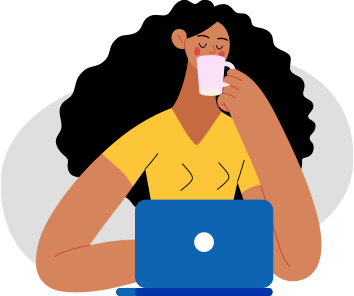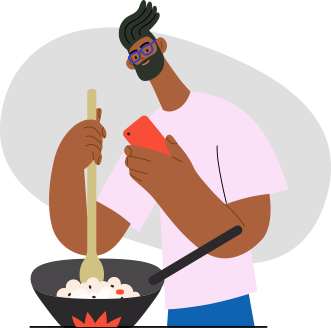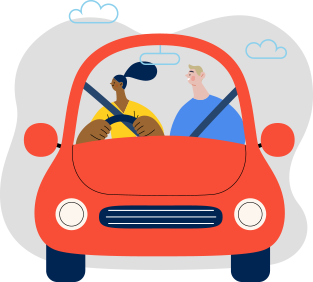What’s it like to live in Australia?
Living in Australia gives you the opportunity to enjoy a laid-back lifestyle and friendly culture. During your down-time and semester breaks you can experience Australia’s unique bushlands and outdoor spaces, play sports, get a part-time job, volunteer, join community groups, worship, or immerse yourself in local museums and cultural experiences.
There’s so much to do, so spend some time planning where you will live, how you will get around, and how much money you will need for food, personal expenses, and entertainment — plus the ongoing costs of your course. We’ll outline the essentials for working on a student visa, finding accommodation, researching the cost of living, and much more.

Work
Working on a visa
International students with an approved visa 500 are able to work and earn money while studying. There are limits on the amount of hours you can work, plus a number of other restrictions (as follows):- You can only work up to 48 hours per fortnight (ie, a period of 14 days beginning on a Monday) while your course is in session.
- You cannot begin working until after your course has started.
- You must remain enrolled in your course and maintain satisfactory attendance and course progression.
- You cannot change your course, thesis, or research topic (unless you have official approval from a Government official).
- You must maintain adequate health insurance.
Take the time to learn all of the work restrictions associated with your student visa, because if you break any of the rules, your visa may be cancelled and you will have to leave the country.
Working conditions in Australia
Australia has a high standard of living and international students are entitled to the same rates of pay, entitlements, worker’s rights, and employment standards offered to all Australian workers. Some of these include:- Minimum pay rates — the Australian government sets minimum pay rates for all the different occupations (eg, bar attendant, customer service agent, farm hand) and your employer cannot negotiate a lower salary with you. You must be paid for ALL the hours you work, according to these minimum pay rates.
- Paid with money — you must be paid your wages in money (eg, cash, direct bank deposit) and not in goods like food, clothes, or accommodation.
- Working hours — when you work in Australia you are entitled to regular breaks and time off. If your employer wants to work above and beyond the maximum hours (or on your day off) they must pay you penalty rates.
- Pay slips — your employer must provide a written/electronic pay slip with your salary. Your pay slip should clearly show how much you were paid including: the hours you worked, your rate of pay, any penalty rates or bonuses you received, and the amount of tax that was deducted from your salary.
- Protection from discrimination — in Australia it is illegal for an employer to discriminate against you based on your skin colour, nationality, gender, sexuality, or gender expression, age, or physical disability.
If you believe that your employer is underpaying you or taking advantage of your visa status, you should contact the FairWork Ombudsman (FWO) on 13 13 94. You will not be penalised or have your visa cancelled for reporting your concerns to the FWO.
Tax and superannuation
If you have been in Australia for more than 6 months, you may be regarded as an Australian resident for tax purposes. This means you:- Need a Tax File Number (TFN) — apply for a TFN with the Australian Taxation Office (ATO), then give this number to your employer and your banking institutions.
- Need to lodge a tax return — tax returns are lodged online with the ATO between 1 July and 31 October each year. If you need help lodging your return, you can use the ATO’s free assistance service.
- May be entitled to superannuation — ‘super’ is a type of retirement fund and employers make contributions on your behalf. When you leave Australia, you may be able to have this money released into your bank account.
Helpful resources
- Home Affairs Australia: Work Restrictions for Student Visa Holders
- Indeed Australia: Find a Job in Australia
- Fair Work Ombudsman: Fair Work Australia for Employees
- Fair Work Ombudsman: Minimum Wage Australia
- Australian Taxation Office: Applying for a Tax File Number (TFN)
- Australian Taxation Office: Returning to Your Home Country

Accommodation
Getting the right accommodation is a top priority for international students. You want to live somewhere that’s clean, safe, and comfortable, with enough private space to study — but also fits into your budget.
Student accommodation can be highly competitive, especially in the major cities and suburbs near a university, so begin planning as soon as your course enrolment is confirmed.
Apart from the budget, your primary considerations will be the location of your accommodation and whether you want to live by yourself or with other people.
Do your research carefully because your weekly expenses will be greatly impacted by the:- Distance from the university, school, or training centre.
- Availability, service area, and timetables of public transport (buses, trains, trams).
- Location of amenities like shopping centres, libraries, healthcare providers.
- Mobile phone coverage and internet services.
Short-term Accommodation
Many international students begin their life in Australia in short-term accommodation. This includes hotels, backpacker hostels, and AirBNB opportunities.
Short-term accommodation is a great place to get started, but becomes expensive over the long-term. And some of those hostels are very, very noisy.
Renting Houses, Apartments, and Studios
If you have a generous budget and value your independence, renting a house or apartment may be the best living arrangement for you.
You can find a rental property using online rental sites (see the links below), visiting real estate agents, checking notice boards at the university or shopping centres, or in Facebook groups.
When you rent a house or apartment in Australia you will need to pay a security bond of 4 week’s rent, plus an additional 2-4 week’s rent in advance. The security bond is placed in a government holding account and may be used by the landlord to cover the costs of any property damage (beyond normal wear and tear) . When you move out, the landlord (or their agent) will inspect the property and, if there are no damages, release your security bond.
All rental tenants in Australia are protected under state and territory laws. For advice and assistance, Google search the Fair Trading, Tenancy Authority, or Consumer Affairs agency in your region.
Share Accommodation
Rental houses in Australia can be very expensive, so many students prefer to find a housemate (usually known as flatmates in Australia) to share the cost of living. You could join an existing sharehouse, find a place to rent with some of your friends, or rent a house on your own then advertise for flatmates.
All three options have their advantages and disadvantages, but if you decide to find a flatmate, make sure you ask some key questions. You may want to know in advance:- Their attitude and intentions toward cleaning and contributing to upkeep of the property.
- Whether they have pets, partners, friends, or relatives who want to visit or sleep over.
- How long they plan to stay.
- What they do on nights and weekends — and if it involves anything you may not like (noisy parties, instruments, etc).
- Personal habits that may negatively impact you (eg, smoking, drug use, etc).
University and College Accommodation
Some Australian universities and colleges have accommodation facilities for their students. This can be a cost-effective option for new students who are still finding their way around as they are usually fully furnished, close to the university, and fees are inclusive of utilities and WIFI.
Homestay
Another popular accommodation option is the homestay — where you live with a host family in their private home. Homestay is usually much cheaper than independent renting, with the added bonus of your host family introducing you to the sights and facilities of the local area. Even better, it’s an authentic introduction to Australian lifestyle and culture.
Helpful resources
- Houses and Apartments to Rent: realestate.com.au/rent
- Properties to Rent: property.com.au/rent
- Share Accommodation Network: flatmates.com.au
- Find a Flatmate: flatmatefinders.com.au
- Short-term Rentals: airbnb.com/australia/stays/monthly
- Stay in a Private Home: homestay.com

Transport
Transport is an important consideration for international students because it will have a big impact on your weekly living expenses. Depending on your budget, you can use public transport or drive a car.
Public Transport
Public transport in Australia is managed and provided by state and territory governments. Fares vary greatly between regions, and depending on where you live, may include buses, trains, trams, and ferries.
Some states and territories offer travel concessions to international students, while others do not. We recommend searching the relevant Road and Transport Authority by using the links we’ve provided at the end of this section.
Taxis and Ridesharing
Australia also has several networks of taxis, limousines, and ridesharing services such as Uber and Rydo. Because of Australia’s low population density and the long distances between many suburbs and towns, these transport options can be quite expensive. Do your research carefully, and don’t assume ridesharing will be cheaper than a taxi, often it’s not.
Driving in Australia
Driving is a good option if you are studying in a regional area or have practical assignments in the field. If you already hold a driver’s licence in your home country, and it’s in English, you may be able to drive in Australia for the first 3 months. After that you will need to get an Australian driver’s licence.
Driver’s licences are managed and issued by the Road and Traffic Authority in each state or territory — so if you are living in Sydney, you will need a NSW licence, or in Cairns you’ll need a Queensland Licence.
The costs of your licence (as well as the limitations on foreign drivers) are different in every state or territory. If you want to drive in Australia, do your research before arriving because penalties and fines for non-compliance can be severe.
Helpful resources
- Transport NSW: Services and Timetables of Public Transport in NSW
- Transport Canberra: Concession Information for Students Travelling in the ACT
- Public Transport Victoria: MYKI Ticketing System for Students in Victoria
- Transport Services Tasmania: Passenger Transport Available in Tasmania
- Adelaide Metro: Services and Timetables for SA students
- Transperth: Services and Timetables in the Perth metro area
- Northern Territory Government: Transport Services in NT
- Translink: Concession Information for Students Travelling in Queensland

Time zones and Daylight Saving
Australia is a big country and has 3 different time zones. You should quickly learn your city/region’s time zone so you can accurately schedule your classwork and stay in touch with your family and friends back home.
Another important consideration is Australian daylight saving times (DST). Daylight saving is the practice of advancing clocks by one hour during late Spring, Summer, and early Autumn (Fall) — so there is more time in the evenings to enjoy the great outdoors. Not all regions of Australia practice daylight saving so do your research to ensure you’re in-sync with your classmates and the local area.
Helpful resources
- Australian Government: Time-zones and daylight saving

Cost of living
Living Expenses
Before arriving in Australia, it’s important to make a realistic plan for your living expenses and study costs. This can be a challenging exercise for students who are living away from the family home for the very first time.
Try to think of every single thing you will need to use, eat, drink, or wear — as well as supporting services like public transport or going to the dentist. Here’s a quick list to get you started:- Study costs — apart from your tuition fees, textbooks, university admin and miscellaneous fees, you will also need a computer and essential software subscriptions. For some courses you may also require a printer, stationery, and equipment related to the course (eg, design students may need a digital SLR camera, while sound engineering students may need a mixer, microphones, and recording equipment, nursing students may require uniforms and enclosed shoes).
- Accommodation — this includes your rental bond (paid before moving in), weekly charges for rent or board, plus monthly utilities charges including electricity, water, and gas.
- Phone and Internet — ongoing costs associated with your mobile phone or internet service.
- Transport — after you’ve paid for you your flights into Australia and initial transport to your accommodation, you will also need transport between home and uni/work/shopping centres. Don’t forget to allow for transport costs when you are on semester break and want to do some domestic travel.
- Food and groceries — allow for your daily meals and personal needs (soap, feminine hygiene products, shampoo) as well as costs for dining out and entertainment.
- Health and medical — apart from your annual health insurance policy you will also need to budget for pharmaceuticals, dental fees, and doctor’s consultations.
- Entertainment — if you are working and studying full time, don’t forget to leave some money for the fun stuff: dining out, having a drink with friends, going to the movies, seeing a live band, or visiting one of Australia’s fantastic tourist attractions.
Cost of Living Calculator
Australia is a big country and living costs vary between capital cities and regional areas. The Australian government has developed an excellent online tool to help you forecast living costs in the 8 x major cities: Sydney, Melbourne, Brisbane, Perth, Canberra, Adelaide, Darwin, and Hobart. You can find it here: Australia Cost of Living Calculator.
Banking
Your student life in Australia will be much easier if you have an Australian bank account. Cash is becoming less popular in many Australian stores and entertainment venues, with a growing majority of consumers preferring to pay with single-tap bank cards or digital wallets.
There are a large number of banks in Australia and most of them will allow you to open an account before you arrive in the country. As a minimum you will need your Confirmation of Enrolment (eCoE), passport, and identification documents to get setup.
Australia’s official currency is the AUD$ Australian Dollar and you can easily transfer money from your home currency into your new bank account. Even better, the major banks have excellent internet banking services where you can transfer funds, pay bills, and manage your account balances from your computer or mobile phone.
Australia’s ‘big four’ Banks
Here are links for Australia’s top 4 banks, but we recommend shopping around as some of the smaller banks offer more competitive account fees and interest rates.- Australia & New Zealand Banking Group (ANZ)
- Commonwealth Bank Australia (CBA)
- National Australia Bank (NAB)
- Westpac Banking Corporation (WBC)
Phone and Internet
Reliable phone and internet is essential for international students, so take the time to research the wide range of Australian mobile phone providers, service areas, and internet plans.
Australia currently operates on 3G, 4G and 5G, but the 3G network is scheduled for shutdown in July 2024. If you are bringing a phone from your home country, make sure it is compatible with at least one of these networks.
Mobile phone providers Australia
The largest providers are Telstra, Optus, Vodafone, TPG, Southern Phone, Woolworths, Virgin Mobile, ALDImobile, amaysim, and Kogan — but do your research because there are plenty of good choices.
Considering your options
As soon as you arrive in Australia you should get yourself an Australian SIM card so you can contact the university and start arranging your accommodation and study requirements.
While there are opportunities for free WIFI at some Australian shopping centres, libraries, hostels, and cafes they are unlikely to be sufficient for your long term needs.
Like most countries, you have three different phone/internet options:- Prepaid Mobile — this is where you pay for your mobile or internet usage in advance. Once you have a SIM card and an Australian bank account, you can reload your mobile online. This is a great option if you don’t want to be locked into a contract, but you will lose any unused call-time or data if it expires.
- Postpaid Plans — are generally cheaper over the long-term than prepaid mobile, but you will have to sign a contract for at least 12-24 months. Postpaid mobile plans include calls, data, and some streaming services — and there are usually options to add international calls.
- Home Broadband — if you are renting a house or apartment you can have a broadband service and landline installed. Home broadband is fast and reliable, but you will be locked into a contact for at least 12-24 months.

Top Universities
Need help deciding on a University? Compare Australian Universities by their global and national rank.

How do I get started?
A comprehensive guide to the student visa application process and how to take the first step.

Our partners
We’ve partnered with reputable agents that can help you every step of the way to studying in Australia.
